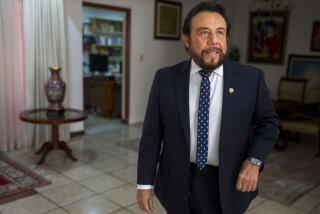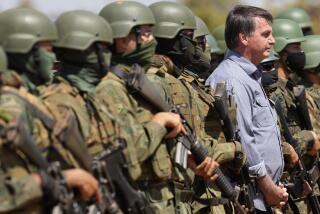Aquino Orders Disbanding of Vigilantes, Paramilitary
- Share via
MANILA — Philippine President Corazon Aquino on Monday ordered the dismantling of all vigilante squads and civilian paramilitary forces in the country, in a move likely to anger many military commanders and leaders of the right-wing political opposition.
Invoking her rarely used power to govern by presidential decree, Aquino gave her secretaries of defense and local governments six weeks to draft a comprehensive plan phasing out the armed civilian paramilitary groups, which have grown rapidly throughout the Philippines in recent months.
Both of those Cabinet officials, however, have publicly endorsed the vigilante groups, and Jaime Ferrer, Aquino’s secretary for local governments, told The Times in an interview a week ago that President Aquino was “enthused” over the concept of using local civilians to police their own towns and villages against Communist guerrillas.
Defense Secretary Rafael Ileto and the armed forces chief of staff, Gen. Fidel V. Ramos, also supported the arming of civilians to augment the 200,000-member military’s increasingly frustrated attempts to end the nation’s 18-year Communist insurgency.
It was unclear what prompted Aquino’s unilateral decree, in which the president cited a provision in the recently adopted national constitution in ordering that the 70,000-man Civilian Home Defense Force, a nationwide paramilitary network created 10 years ago by then-President Ferdinand E. Marcos, be gradually dissolved during the next three years.
Eventually, Aquino has said, she wants to integrate the paramilitary forces into local police departments under the control of local mayors. Marcos gave the military absolute power over the armed civilian units after he declared martial law in 1972, and their members have been accused frequently of violating human rights throughout the country.
Principal Communist Demand
The dismantling of the paramilitary forces was a principal demand of negotiators for the Communist rebels during two months of peace negotiations that ended Feb. 8. In the past two years alone, the paramilitary units have been charged with the murders of Roman Catholic priests and scores of civilians.
But Aquino’s decree also ordered the disbanding of “all private armies and other armed groups,” which, according to a report by state-run television Monday night, includes not only the vigilante squads but the private armies of regional political warlords as well. Military officials have estimated that there are still 260 private armies, ranging in size from a few hundred men to more than 2,000, operating in these islands.
Sources in Aquino’s presidential palace said she met twice over the weekend with her trusted commandant of the Philippine Military Academy, a highly respected marine general who for years has been a quiet opponent of the use of untrained civilian vigilantes in counterinsurgency operations.
Too Vocal on Issue
One official source close to the president added that Aquino, who had not taken a public stand on the recent rise of vigilantism in the country before Monday, felt that Secretary Ferrer had been too vocal on the issue and suspected that he was trying to dictate government policy in his public endorsements of the armed civilian groups.
Ferrer said last week that the rise of vigilante groups such as the armed, 3,000-member Alsa Masa (Uprising Masses) in the war-torn southern metropolis of Davao City was “the only way” to end the nation’s intractable insurgency, which has left more than 20,000 Filipinos dead in the past decade. “This is the right approach,” he said.
As further confirmation that the president’s order will include the disarming of Alsa Masa and similar vigilante groups that have been formed and armed with the help of local military commanders in recent months, it was noted Monday that Davao City’s army commander, Col. Franco Calida, has said he was authorized to arm the vigilantes because he was deputizing them as members of local Civilian Home Defense Forces.
Opposition Reaction
There was no immediate comment on Aquino’s order from the nation’s armed forces. But several leaders of the political opposition immediately charged that Aquino was giving in to the political leftists within her coalition government.
“If this government will disband Alsa Masa, we will resist, because this government will be Communist,” said Juan Pala, a local disc jockey who has been so zealous in his support for the anti-Communist vigilantes that he keeps a grenade launcher in his studio and claims to have planted land mines on the grounds around his radio station.
“I will make trouble for this government in Davao City,” Pala said.
The vigilantes, however, have been criticized with equal fervor by religious leaders and even by some senior military commanders, who have said they fear it will be difficult to disarm the groups in the future.
Comparing the vigilante squads to “Frankenstein,” one top aide to Gen. Ramos told The Times last week: “Most of these people are unemployed. What happens when their campaign against the Communists is finished? We’ll have yet another armed group running around with no livelihood, firearms and a license to kill.”
Ramos Lukewarm on Issue
Ramos expressed lukewarm public support for the private armies and civilian armed groups during a press conference after a two-day trip to Davao City last week, but he generally has been campaigning against their growth since he was appointed by Aquino when she took power a year ago.
The military has estimated that there are more than 100,000 unregistered “loose firearms” in the hands of Philippine civilians, and Ramos has warned that unless the government can recover or at least account for the high-powered rifles and handguns, the Philippines could become another Lebanon.
The nation’s religious leaders have opposed the right-wing vigilante groups even more stridently, likening them to the “death squads” of El Salvador.
Father Jack Walsh, an American Roman Catholic priest who has lived in the Davao City area for 25 years, said groups like Alsa Masa are “nothing more than a surrogate army that could be called upon simply to do the dirty work for the military.”
If the groups are not checked, Walsh asserted, the result will be “general chaos” and eventually “a bloodbath” between the armed civilians and guerrilla units of the 23,000-member Communist guerrilla force, the New People’s Army.
U.S. Involvement Suspected
Several church leaders also have voiced suspicion that the U.S. government was secretly involved in the growth of the vigilante groups, a suspicion that echoes America’s past counterinsurgency policies in Vietnam and El Salvador.
In addition, one of 24 candidates whom Aquino is sponsoring in upcoming elections, which will create a national Senate for the first time since her rise to power, also condemned the U.S. government for “setting the stage for the return of a militarist and right-wing government” in the Philippines.
Raul Manglapus, who lived in self-imposed exile in Los Angeles for many years while Marcos was in power, cited on Monday a recent series of meetings between Aquino government officials and former U.S. intelligence officials, among them retired U.S. Army Gen. John K. Singlaub, who was the Pentagon’s chief architect of the civilian-based U.S.-backed counterinsurgency effort in El Salvador.
Those concerns were heightened Monday afternoon when Richard Childress, the U.S. National Security Council’s director of East Asia affairs, arrived in Manila for talks with senior government officials.
Childress told reporters that he was in the Philippines on “a fact-finding trip.”
More to Read
Sign up for Essential California
The most important California stories and recommendations in your inbox every morning.
You may occasionally receive promotional content from the Los Angeles Times.












